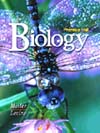Biology
by Miller & Levine
What
Discoveries Lie Ahead?
Click
on any of the unit titles below for updates on some of the latest discoveries
in each area of biology
At the beginning of each unit of the Dragonfly Book, authors Ken Miller and Joe Levine speculated on what discoveries might lie ahead in each area of biology.
Click on any unit for an update from the authors on the latest discoveries in each area.
UNIT
1: The Nature of Life
• How will individuals, businesses, and governments respond to new information about humanity's complex effects on the living world?
• How will studies of life's smallest systems (molecules) help us understand the largest biological systems (ecosystems and the biosphere)?
• How will individuals, businesses, and governments respond to new information about humanity's complex effects on the living world?
• How will studies of life's smallest systems (molecules) help us understand the largest biological systems (ecosystems and the biosphere)?
UNIT
2: Ecology
• Can our society learn how to produce the food and energy we need while preserving the environment?
• How will the introduction of new species affect native plants and animals?
• Can our society learn how to produce the food and energy we need while preserving the environment?
• How will the introduction of new species affect native plants and animals?
UNIT
3: Cells
• What are the signals that determine whether cells will develop into bones, muscles, nerves, or other tissues in the body?
• Can we use our understanding of photosynthesis to help improve crop yields and help feed the world's hungry?
• Can we learn enough about the control of cell division to find ways to stop the uncontrolled growth of cells known as cancer?
• What are the signals that determine whether cells will develop into bones, muscles, nerves, or other tissues in the body?
• Can we use our understanding of photosynthesis to help improve crop yields and help feed the world's hungry?
• Can we learn enough about the control of cell division to find ways to stop the uncontrolled growth of cells known as cancer?
UNIT
4: Genetics
• Can we use the information from the Human Genome Project effectively to cure disease and alleviate human suffering?
• Will we develop ways to use genetic engineering wisely and respect the natural environment of the world in which we live?
• Can we use the information from the Human Genome Project effectively to cure disease and alleviate human suffering?
• Will we develop ways to use genetic engineering wisely and respect the natural environment of the world in which we live?
UNIT
5: Evolution
• Can evolutionary theory predict which strains of fly, AIDS, and West Nile virus will be most deadly next year?
• What new forms of life will researchers discover?
• What will the study of fossils and genes reveal about the early evolution of plants and animals?
• Can evolutionary theory predict which strains of fly, AIDS, and West Nile virus will be most deadly next year?
• What new forms of life will researchers discover?
• What will the study of fossils and genes reveal about the early evolution of plants and animals?
UNIT
6: Microorganisms and Fungi
• Can we learn enough about viruses to develop cures for viral diseases?
• Will we be able to fully grasp the role that microorganisms play in maintaining the natural environment?
• Can we learn enough about viruses to develop cures for viral diseases?
• Will we be able to fully grasp the role that microorganisms play in maintaining the natural environment?
UNIT
7: Plants
• Will studies of plant reveal new compounds that can be effective in treating human disease?
• Can we learn enough from studies of plant genetics to produce new crops that will feed more people around the world and place less stress on the environment?
• Will studies of plant reveal new compounds that can be effective in treating human disease?
• Can we learn enough from studies of plant genetics to produce new crops that will feed more people around the world and place less stress on the environment?
UNIT
8: Invertebrates
• Can a better understanding of insects help protect farms from insect pests and protect humans from insect-borne diseases?
• What will paleontology and molecular genetics tell us about how major groups of invertebrates are related to one another — and to us?
• Can a better understanding of insects help protect farms from insect pests and protect humans from insect-borne diseases?
• What will paleontology and molecular genetics tell us about how major groups of invertebrates are related to one another — and to us?
UNIT
9: Chordates
• What environmental factors are causing declines in amphibian populations — and what do those declines mean for the health of ecosystems?
• Just how and when did the first four-limbed vertebrates leave the water for the land?
• What environmental factors are causing declines in amphibian populations — and what do those declines mean for the health of ecosystems?
• Just how and when did the first four-limbed vertebrates leave the water for the land?
UNIT
10: The Human Body
• Can we learn enough about the brain and nervous system to account for the subtleties of human behavior, thought, and learning?
• Will we master the immune system to the point that we can use its powerful weaponry against challenges such as cancer and AIDS?
• Can we learn enough about the brain and nervous system to account for the subtleties of human behavior, thought, and learning?
• Will we master the immune system to the point that we can use its powerful weaponry against challenges such as cancer and AIDS?
